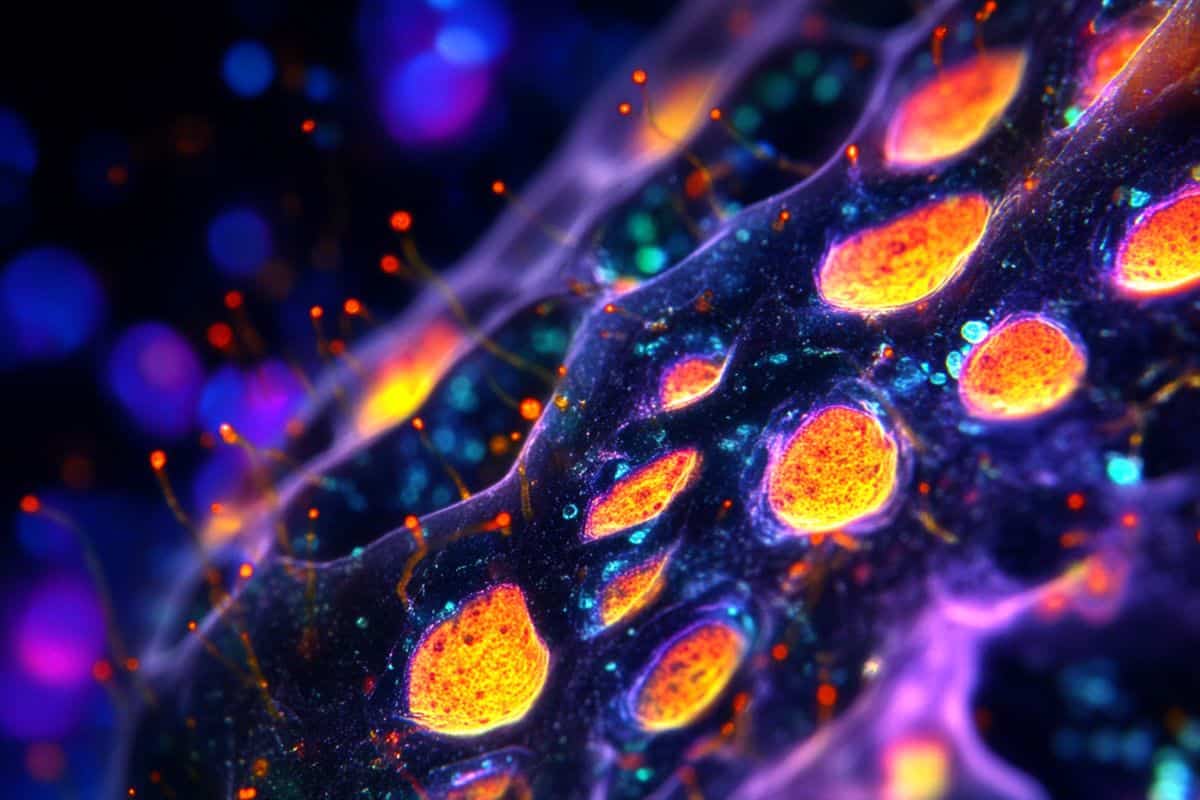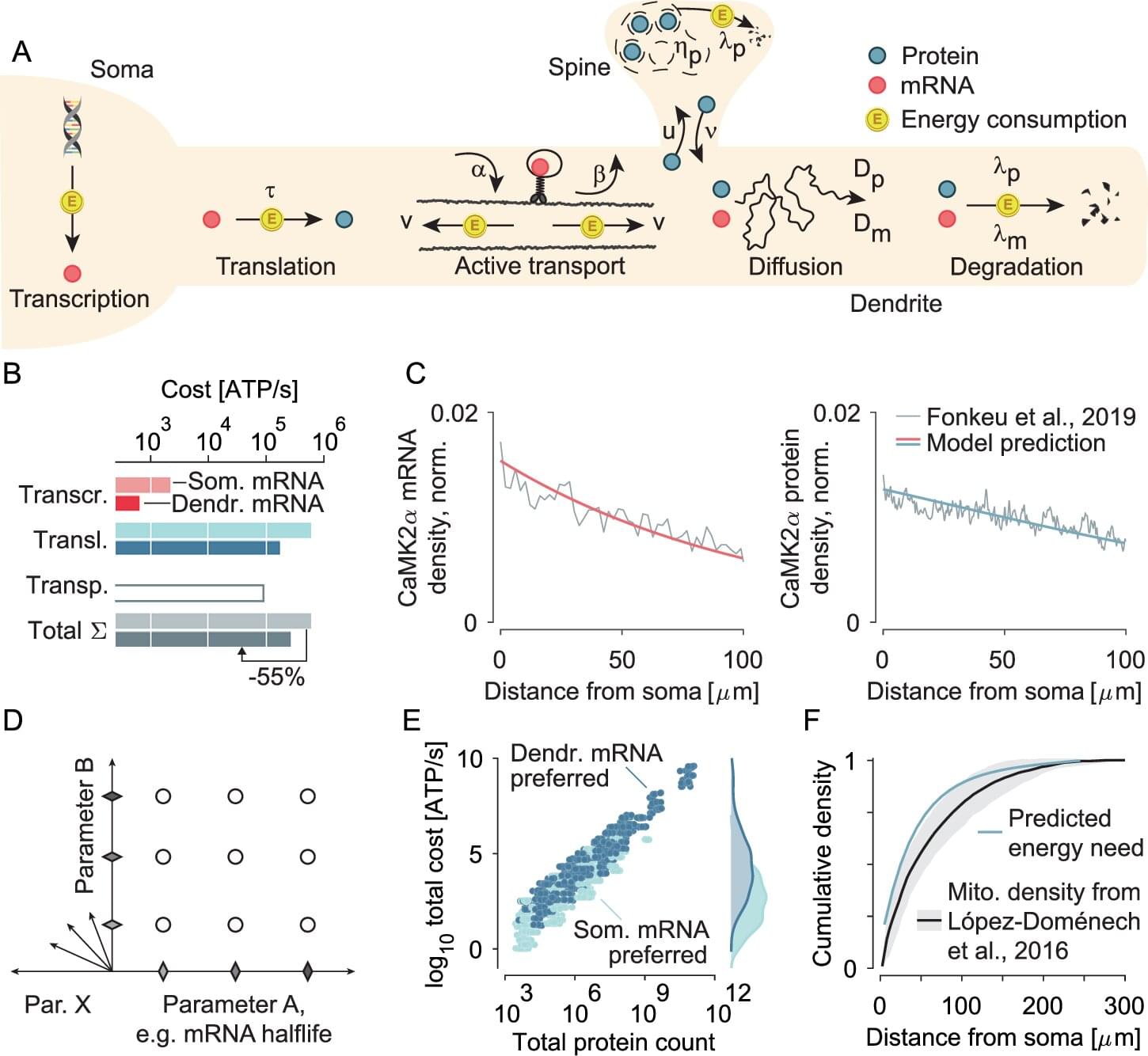Penn State researchers have created LivGels, a self-healing hydrogel that mimics extracellular matrix (ECM) properties, including strain-stiffening and mechanical adaptability.


Join us on Patreon! https://www.patreon.com/MichaelLustgartenPhD
Discount Links/Affiliates:
Blood testing (where I get the majority of my labs): https://www.ultalabtests.com/partners/michaellustgarten.
At-Home Metabolomics: https://www.iollo.com?ref=michael-lustgarten.
Use Code: CONQUERAGING At Checkout.
Clearly Filtered Water Filter: https://get.aspr.app/SHoPY
Epigenetic, Telomere Testing: https://trudiagnostic.com/?irclickid=U-s3Ii2r7xyIU-LSYLyQdQ6…M0&irgwc=1
Use Code: CONQUERAGING
NAD+ Quantification: https://www.jinfiniti.com/intracellular-nad-test/

Summary: Scientists have discovered that neural stem cells (NSCs) receive constant feedback from their daughter cells, influencing whether they remain dormant or activate to form new neurons and glia. This parent-child relationship helps regulate brain regeneration and repair.
The study also reveals that calcium signaling plays a key role in how NSCs decode multiple signals from their environment. If NSCs produce only a few daughter cells, they activate; if they produce many, they stay dormant.
These findings challenge previous assumptions that NSCs function independently and open new avenues for treating neurodevelopmental disorders. Future research will explore how these processes change in aging and disease.
Here we report on the collaboration of Open AI and Retro Biotech using GPT-4b to investigate ways to improve the efficacy of the Yamanaka factors in reprogramming cells.
Some links are affiliate links so we will earn a commission when they are used to purchase products.
If you would like to support our channel please consider joining our patreon / modernhealthspan.
Stemregen 15% discount Code MODERN https://tinyurl.com/45z968yr (Only available in the US)
DoNotAge 10% discount code MHS https://tinyurl.com/6dbvhv87
Creatine http://tinyurl.com/m6jc9auf CoQ10 https://tinyurl.com/4tpjxw7r.
Renue By Science 10% discount code MHS: https://tinyurl.com/37ahmr7d.
Skin & Body Essentials https://tinyurl.com/536zvrcr.
Wellness Extract 10% discount Code MODERNWE Geranylgeraniol Essential http://wellnessextract.com/RICHARDWE Delta Gold Vit E
ProHealth 15% discount code: MODERN NMNH 125mg https://prohealth.pxf.io/kOaR53
NOVOS Core $5 discount CODE 5OFFMHS24 https://novos.sjv.io/daqJ0Q
n1o1 Nitric Oxide 10% discount with code Modern https://tinyurl.com/3esakm4s.
n1o1 Nitric Oxide Lozenges https://tinyurl.com/yh4rrtht.
Age-Defiance Face Cream https://tinyurl.com/4zr959zh.
Pendulum 20% Discount Code HEALTHSPAN Akkermansia pendulumtherapeutics.sjv.io/baoQVg.
Metabolic Daily https://pendulumtherapeutics.sjv.io/N… 5% discount Code MODERN https://omegaquant.com/shop/ Bulletproof 15% off with coupon code: HEALTHSPAN15: https://tinyurl.com/4npjk5vp Inner Fuel Gut support https://bulletproof.fdf2.net/PyDKDM Omega-3 Krill Oil https://bulletproof.fdf2.net/xkdxmy Nuchido Time+ 20% discount of first purchase with code MODERN20 https://nuchido.com/MODERN OneSkin 15% Discount: Code MODERN https://tinyurl.com/3t6tevj8 OS-01 Face Topical Supplement https://tinyurl.com/29c8wrr2 ☕If you would like to support our channel, we’d love a coffee…thank you! https://www.buymeacoffee.com/mhealthspan 🌐Links in this video MIT Report https://www.technologyreview.com/2025… *************************************** Health claims Disclosure: Information provided on this video is not a substitute for direct, individual medical treatment or advice. Please consult with your doctor first. Products or services mentioned in this video are not a recommendation. Audio Copyright Disclaimer Please note that we have full authorization to the music that we used in our videos as they were created using the service WeVideo which provides the rights to the music. The rights are detailed in the terms of use that can be reviewed here https://www.wevideo.com/terms-of-use and any following inquiries should be addressed to [email protected]. ********************************************** #stemcells #ai #rejuvenation.
OmegaQuant 5% discount Code MODERN https://omegaquant.com/shop/
Bulletproof 15% off with coupon code: HEALTHSPAN15: https://tinyurl.com/4npjk5vp.
Inner Fuel Gut support https://bulletproof.fdf2.net/PyDKDM
Omega-3 Krill Oil https://bulletproof.fdf2.net/xkdxmy.
Nuchido Time+ 20% discount of first purchase with code MODERN20 https://nuchido.com/MODERN
OneSkin 15% Discount: Code MODERN https://tinyurl.com/3t6tevj8 OS-01 Face Topical Supplement https://tinyurl.com/29c8wrr2
☕If you would like to support our channel, we’d love a coffee…thank you! https://www.buymeacoffee.com/mhealthspan.
🌐Links in this video.
MIT Report https://www.technologyreview.com/2025…
*******************************
Health claims Disclosure: Information provided on this video is not a substitute for direct, individual medical treatment or advice. Please consult with your doctor first. Products or services mentioned in this video are not a recommendation.
Audio Copyright Disclaimer.
Please note that we have full authorization to the music that we used in our videos as they were created using the service WeVideo which provides the rights to the music. The rights are detailed in the terms of use that can be reviewed here https://www.wevideo.com/terms-of-use and any following inquiries should be addressed to [email protected].
**************************************
Environmental Gerontology & Vulnerability Science For Health And Well-Being — Dr. Amir Baniassadi, Ph.D. — Marcus Institute for Aging Research, Hebrew SeniorLife / Harvard Medical School.
Dr. Amir Baniassadi, Ph.D. is an Instructor of Medicine at Harvard Medical School and an Assistant Scientist in Marcus Institute for Aging Research (https://www.marcusinstituteforaging.o… where he works on environmental impacts on health and well-being of older populations.
Dr. Baniassadi works on the impacts of ambient air temperature and air quality (both indoors and outdoors) on outcomes related to the health and well-being of physiologically and socioeconomically vulnerable populations. His research applies novel environmental modeling and measurement techniques along with remote and long-term physiological and functional monitoring of individuals to establish relationships between exposure and outcome variables of interest outside clinical lab settings. The ultimate goal of his research is to develop environmental interventions that optimize the environment for health and longevity of older adults.
Dr. Baniassadi has a Ph.D. in Civil, Environmental, and Sustainable Engineering from Arizona State University and a B.Sc. degree in Mechanical Engineering from the University of Tehran. His post-doctoral training includes a three-year T32 fellowship in Translational Research in Older adults, and a two-year postdoctoral fellowship at Harvard University Graduate School of Design.
#AmirBaniassadi #HarvardMedicalSchool #MarcusInstituteForAgingResearch #EnvironmentalGerontology #VulnerabilityScience #Exposome #Health #WellBeing #Wearables #SmartHome #AgingInPlace #Thermoregulation #HeatIslands.
Some people will do anything to live forever: injecting young blood, freezing their heads, even zapping themselves with electricity in places you’d rather not imagine. On today’s episode of The Infographics Show, we’re diving into the strangest and most extreme attempts to cheat death, and why they might make you rethink wanting to live forever!
🔔 Don’t forget to SUBSCRIBE! 🔔
SUGGEST A TOPIC:
https://bit.ly/suggest-an-infographic… Come chat with me: / discord 🔖 MY SOCIAL PAGES TikTok ►
/ theinfographicsshow Facebook ►
/ theinfographicsshow 📝 SOURCES: https://pastebin.com/tFgaewF3 All videos are based on publicly available information unless otherwise noted.
💬 Come chat with me: / discord.
🔖 MY SOCIAL PAGES
TikTok ► / theinfographicsshow.
Facebook ► / theinfographicsshow.
📝 SOURCES: https://pastebin.com/tFgaewF3

Nerve cells have amazing strategies to save energy and still perform the most important of their tasks. Researchers from the University Hospital Bonn (UKB) and the University of Bonn as well as the University Medical Center Göttingen found that the neuronal energy conservation program determines the location and number of messenger RNA (mRNA) and proteins and differs depending on the length, longevity and other properties of the respective molecule. The work has now been published in Nature Communications.
We have all experienced the need to save energy in recent years. To do this, we all had to come up with strategies to save energy while still meeting our most important needs.
Our nerve cells are facing a similar dilemma: They have to supply their synapses, i.e., their contact points with other neurons, but also organize their protein synthesis in such a way that they don’t produce too much or too little proteins.


This is superlongevity! ♾️
“One shark, measuring five meters, was found to be at least 272 years old, with an upper age estimate of more than 500 years (392 +/- 120 years). Another specimen was at least 260 years old, potentially exceeding 400 years. “We definitely expected the sharks to be old, but we didn’t expect that it would be the longest-living vertebrate animal,” Nielsen said.”
The Greenland shark holds the title as the longest-lived vertebrate on Earth, with some individuals potentially reaching 500 years of age. This elusive deep-sea predator, found in the frigid waters of the North Atlantic and Arctic Oceans, has fascinated scientists due to its remarkable lifespan. Its slow growth rate and mysterious biology have made it a subject of ongoing research, shedding light on how some species defy the limits of aging.
A major breakthrough in understanding the longevity of Greenland sharks came from a research team led by Julius Nielsen, a marine biologist at the University of Copenhagen. Nielsen and his colleagues conducted a study that revealed a Greenland shark estimated to be at least 272 years old, with some models suggesting an upper age limit of nearly 500 years.
This finding shattered previous records, surpassing the known lifespan of the 211-year-old bowhead whale, which had long been considered the longest-lived vertebrate.

Published in the Journal of the American Chemical Society, the research by scientists at King’s College London and their collaborators suggests that chromatin—the complex of DNA
DNA, or deoxyribonucleic acid, is a molecule composed of two long strands of nucleotides that coil around each other to form a double helix. It is the hereditary material in humans and almost all other organisms that carries genetic instructions for development, functioning, growth, and reproduction. Nearly every cell in a person’s body has the same DNA. Most DNA is located in the cell nucleus (where it is called nuclear DNA), but a small amount of DNA can also be found in the mitochondria (where it is called mitochondrial DNA or mtDNA).